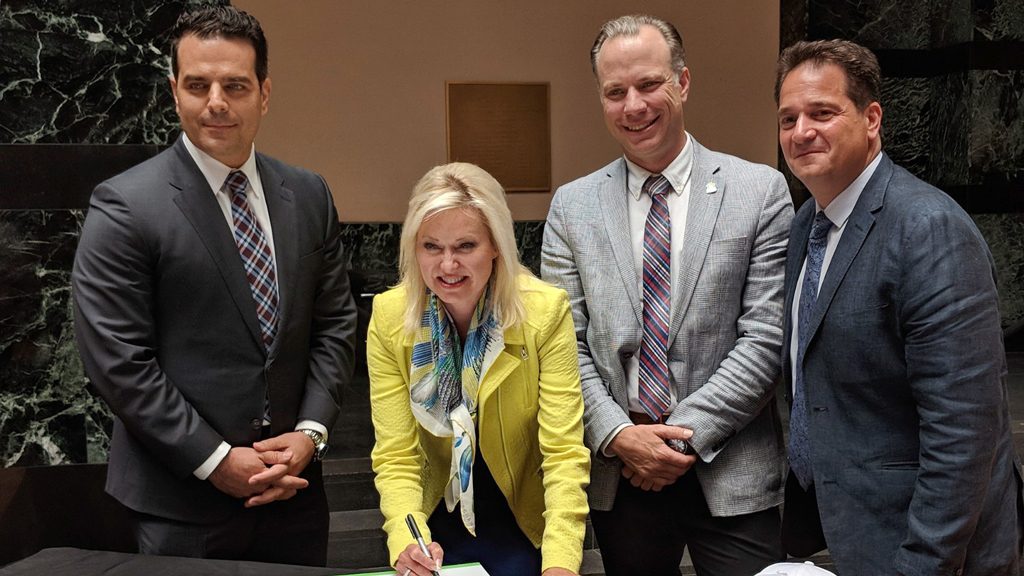The Building Industry and Land Development Association (BILD) has launched a campaign outlining steps Ontario municipalities can take to spur homebuilding in the province.
BILD president and CEO Dave Wilkes called Ontario’s housing shortage a “generational challenge” and urged candidates running in municipal elections this fall to advocate for more infrastructure spending, fewer government charges, less red tape and improved permitting practices.
BILD kicked off the campaign with media conferences in Vaughan, Toronto and Mississauga June 18.
The mayors of Vaughan and Mississauga and Toronto’s deputy mayor signed a housing pledge indicating their cities are committed to engaging in a dialogue with government partners and the development community to take steps to increase the housing stock.
“Part of our objective is playing a forward-looking role in upcoming municipal elections and there’s a new provincial government as well so we wanted to make sure we gave our perspective on what is really a generational challenge,” said Wilkes in an interview.
“And that housing supply is something that needs to be front and centre of the public debate. By 2041 there will be 9.7 million people living in the GTA. So we think these issues have always been important but they are now more important than they have ever been.”
The BILD website indicates there is an annual need for 55,000 new homes in the GTA but in 2017 only 44,000 were built.
The province and municipal governments must be aligned to tackle the supply problem, said Wilkes.
“The provincial policy Places to Grow has designated a lot of areas for increased density. You have to make sure municipal policies are reflecting that,” he said.
The BILD statement said almost one quarter of the cost of a new home in the GTA is composed of the fees, taxes, levies and development charges (DCs) applied by all levels of government and that DCs have increased between 236 and 878 per cent across the GTA since 2004.
Asked if developers had said fees such as DCs are too high and are discouraging building by cutting into profits, Wilkes said, “It is an issue.
“We accept the responsibility of growth paying for growth. We’re not against DCs, in some municipalities across the GTA there is an need for investment in DCs to make sure that investment takes place in order to have that serviceable land.
“Where we see is the potential misuse of DCs is to pay for things that aren’t related to growth. That is an assessment that has to be done on a municipality by municipality basis. We want to make sure that the public understands that the industry accepts its responsibility, but at the same time DCs shouldn’t be used to avoid tough decisions about raising property taxes.”
In making a plea for reducing red tape, Wilkes said it takes 10 years for a housing project to go from conception to completion and noted BILD counts 52 different studies, reports, checklists or plans that developers might have to prepare.
“Ten years, it’s too long, way too long,” he said.
“We think that’s too much and we think in order to get the return on investment with the federal government investment in infrastructure, we need to do the other things right too like ensuring bylaws are right and so on.”
A recent World Bank report that compared the efficiency of building permit systems around the world ranked Toronto’s building permit process at 57th. The city’s building permit review timeframe was found to be 249 days.
The BILD statement called for municipalities to pre-designate land for development and pre-zone that land appropriately; update local official plans and zoning bylaws; encourage the province to expedite outstanding environmental assessments on critical infrastructure; and streamline the list of conditions for municipal approvals.
“Vaughan does it very well,” Wilkes said, referring to pre-zoning. “There are municipalities around that we can look to for best practices, absolutely no doubt about it.”
BILD also called upon municipalities to adopt a new “service standard of excellence” that would increase efficiencies in building departments.
The BILD website, buildforgrowth.ca, has been configured to encourage citizen engagement in the upcoming election with a mechanism established to enable voters to directly connect with municipal candidates, Wilkes noted.









Recent Comments